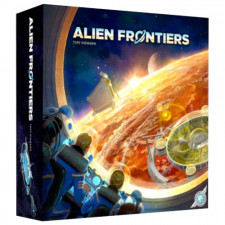Alien Frontiers Review
on Apr 7, 2016
**Please Note: Review is of Alien Frontiers (4th Edition).**
The board game industry has made prolific use of crowdfunding platforms. And one of the very first to find success in that format was Alien Frontiers. The retro-future look captivated players and utilizing dice as workers was relatively novel for its time. A wonderful worker placement style game, this title tragically has a single, almost unforgivable flaw.
Each player starts with three dice representing their three ships. More can be constructed as the game goes on – to a maximum of six. On a turn, a player first rolls their dice. Then, depending on the roll, can place their dice in various locations for positive effects. Players can grab ore and fuel – the two goods used to buy everything else. The value of the dice used for various actions has an impact on how they perform. High numbers will net more fuel and can stop other players from acquiring ore. But low rolls are better if you intend to trade fuel for ore. Rolling three straight (e.g., two, three, four) might allow you to raid another player, taking some of their resources or perhaps their alien technology. If your dice sum to seven or more, you can obtain your own alien technology from the three available in the offering. And, no matter the face, you can always push forward in constructing a colony.
The center of the board features a planet broken into several sectors. Every time you build a colony, you place it in a sector and that nets you one point. If you have the most colonies in a sector, you get a bonus point and access to the related special ability. And the game ends when someone builds their last colony. At game end, most points wins.
On your turn, Alien Frontiers can be phenomenal. You roll the dice and start analyzing your possibilities. If you rolled a five, maybe you can use that to get extra fuel. Or maybe it’s better used grabbing ore and preventing other players from getting it. If you rolled a six, you gain the unique opportunity to convert one of your dice into an immediate colony, while doubles of any number allow you to build more ships (thus rolling more dice on future turns). And, you can always use a die to push along your colony construction. It has seven steps and, upon reaching the end, allows you to build a colony. Choosing how best to use your dice is critical. And, like many worker placement games, blocking certain areas and denying them to opponents is critical.
Plus, any given roll can provide opportunities you weren’t expecting. Is it worth it to give up a die in order to grab a coveted colony location immediately? That particular option provides great tension. Having the extra die means getting more done on your turn. But getting rid of it may get you immediate access to a sector bonus or steal someone else’s bonus point. The option to convert a ship only occurs when you roll a six, so it isn’t something you can necessarily plan for. If your roll doesn’t turn up any sixes, then you simply go on with your turn. But if a six does show up, you have something new to consider. Losing a ship is a big decision, but so is forgoing the opportunity for an immediate colony.
The alien technology cards, too, can be a huge boon. They give you a unique power that you can bring to bear – often allowing you to expend fuel to manipulate your dice into getting what you wanted. Other cards can protect you from player attacks or prevent opponents from building in particular sectors. And those aren’t the only source of powers. Each sector’s special power typically makes the various actions more efficient. In this race to plop down all your colonies, efficiency is the key to any winning strategy.
Alien Frontiers, then, is phenomenal on your turn with interesting choices, plenty to consider, and it is all quite interactive. When it isn’t your turn, though, it’s worthy of far less praise. The problem is that each turn becomes effectively a singular round of planning and execution with little opportunity for advance analysis. Since players don’t roll their dice until the start of their turn, there is precious little planning that can be done in advance. Every turn starts with a roll, and then minutes of staring.
With two players, it’s not so bad. You share the downtime evenly and there are fewer opponents and possibilities to factor into your decision making. But God help you if you play with four (or, horror, five with the expansion). It seems to take ages for it to get back around to your turn. There is literally nothing to do on other players’ turns. You can’t even really plan your own turn because you don’t know will be available to you or how much fuel or ore you’ll be able to get. And, really, there’s no excuse for that in modern design. Turns should either be quick enough that you don’t get bored waiting, or the game state should be so engaging that it is easy to get caught up analyzing your position between turns. Alien Frontiers has neither feature.
While the flaw is significant, it doesn’t prevent Alien Frontiers from being a fantastic experience – for two players. At this player count, it is engaging with its interesting decisions while also providing the right level of interaction. Sitting down with more than two players, though, is a situation best avoided by rational players.

 Customer Support
Customer Support  Subscribe
Subscribe 




 Account
Account  Wishlist
Wishlist 

